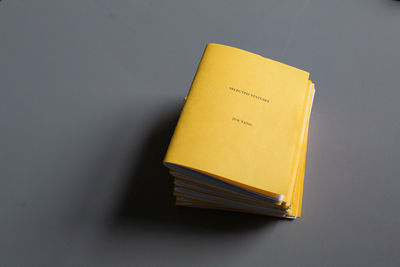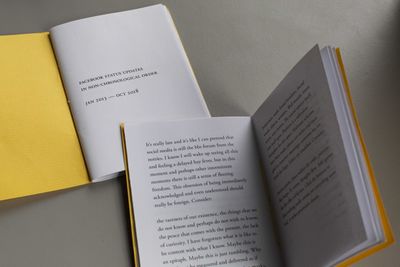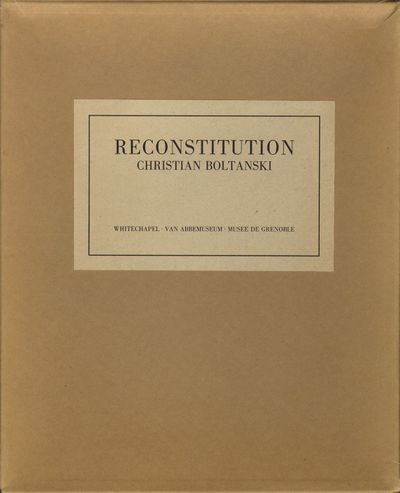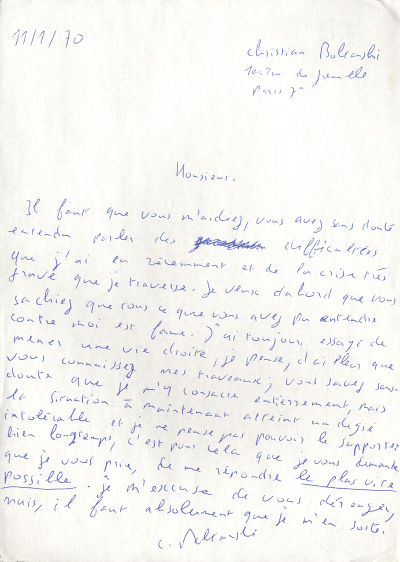Jujube/thesis-drafts: Difference between revisions
m (Jujube moved page Jujube/thesis to Jujube/thesis-drafts) |
|||
| (67 intermediate revisions by the same user not shown) | |||
| Line 1: | Line 1: | ||
= | =Thesis proposal: Writing the Image= | ||
latest: https://docs.google.com/document/d/17f8B3_IX4SmDIgM4GAb3n6-JAGGVsB6zSEMUwA72DLw/edit# | |||
My | My thesis is a memoir in which I reflect on my practice as a writer and filmmaker. It weaves together the personal and the intellectual — namely, my study of film as a medium of expression, union and empathy. I have been jotting down paragraphs since September 2019. There is no particular structure at this moment, but I have noticed recurring questions and the emergence of themes, which are: | ||
: What are the images that I have held onto over the years? | |||
: How do I use words to express these images? | |||
: What are the meanings and the feelings these images carry? | |||
: Why do I write? | |||
: How do I (learn to) express with filmmaking? | |||
The free-writing can be seen on this page: [[jujube/memoir2]]. | |||
I will start to produce via editing and re-writing and substantiate my observations with the text I read and the films/plays/lectures I reviewed as well as realizations from my making. Some key words I have identified are: | |||
: narrative, emotions, emotional intelligence, self-knowledge | |||
: definition of medium, understanding the image, making without knowing all, craft | |||
: solitude, loneliness, spiritual diaspora, trancendance | |||
= References = | |||
Things I have read and notated: | |||
* Campany, D. (2007) The cinematic. London: Whitechapel (Documents of contemporary art, 2007: 5). | |||
* Chee, A. (2018) How to write an autobiographical novel : essays. Boston: Houghton Mifflin Harcourt. | |||
* Kern, S. (2004) A cultural history of causality : science, murder novels, and systems of thought. Princeton: Princeton University Press. | |||
* Farr, I. (2012) Memory. London: Whitechapel Gallery (Documents of contemporary art). | |||
* Mamet, D. (1992) On directing film. New York: Penguin Books. | |||
* Merewether, C. (2006) The archive. London etc: Whitechapel etc (Documents of contemporary art). | |||
* Miall, D. (2011) Emotions and the Structuring of Narrative Responses. Poetics Today 1 June 2011; 32 (2): 323–348. doi: https://doi.org/10.1215/03335372-1162704 | |||
* Nussbaum, M. (1988) Narrative Emotions. Ethics, Vol. 98, No. 2., pp. 225-254. | |||
* Shouse, E. (2005) Feeling, Emotion, Affect. M/C Journal 8.6. <http://journal.media-culture.org.au/0512/03-shouse.php> | |||
* Stallabrass, J. (2013) Documentary. London: Whitechapel (Documents of contemporary art). | |||
* Voìgt, Ellen Bryant. Image. New England Review, Vol. 13, No. 3/4, 1991, pp. 254–268. JSTOR, www.jstor.org/stable/40243421. | |||
I | Things I have in the process of reading/notating: | ||
*Bird Cloud, Anne Proulx | |||
*Limbo, Dan Fox | |||
*The Argonauts, Maggie Nelson | |||
== Form & concept == | |||
[[File:Ss1.jpg|400px]] [[File:Ss2.jpg|400px]] | |||
I | Selected Statuses. A zine I made during the first year consisting of 50 selected status updates that I posted on Facebook from 2013-2018. | ||
[[File:107291.jpg|400px]] [[File:107291 10.jpg |400px]] | |||
Christian Boltanski: Reconstitution [https://www.vincentborrelli.com/pages/books/107291/christian-boltanski/christian-boltanski-reconstitution]. "Heavy brown cardboard box with title printed in black on label pasted to lid, containing 18 items." | |||
== A return to some early thoughts == | |||
[[Jujube/memoir]] | |||
== Photos == | |||
do they serve as illustration, prompts? | |||
: a plastic bag with Chinese label | |||
: sketching a room: a series | |||
: still from Scene 1 | |||
TBC | |||
== Annotated Bibliography == | |||
This is a synthesis of some materials I have read so far. The annotations are colloquial at the moment. As the synthesis continues I plan to become more precise with the literature and succinct in my annotations. | |||
=== feelings === | |||
== | |||
* [[Jujube/synopsis#United_by_Feelings]] | * [[Jujube/synopsis#United_by_Feelings]] | ||
| Line 86: | Line 82: | ||
A few people whose judgement I trust have told me, "nobody can ever understand you in totality," which I have come to agree. In trying to be understood, I finally become able to understand myself. And that's where I connect self-compassion and empathy. | A few people whose judgement I trust have told me, "nobody can ever understand you in totality," which I have come to agree. In trying to be understood, I finally become able to understand myself. And that's where I connect self-compassion and empathy. | ||
== memories == | === memories === | ||
* [[Jujube/synopsis#Siegfried_Kracauer:_Memory_Images.2C_1927]] | * [[Jujube/synopsis#Siegfried_Kracauer:_Memory_Images.2C_1927]] | ||
| Line 99: | Line 95: | ||
I want others to understand, through these images, something about me, something about themselves. | I want others to understand, through these images, something about me, something about themselves. | ||
== the making of images without language == | === the making of images without language === | ||
*[[Jujube/synopsis#The_Cinematic_.28DoCA.29]] | *[[Jujube/synopsis#The_Cinematic_.28DoCA.29]] | ||
| Line 120: | Line 116: | ||
I ask more concrete questions through the things I make: | I ask more concrete questions through the things I make: | ||
Do narrative and personal memory ever come together | Do narrative and personal memory ever come together? Is that the form of the Memoir? Or Must one become fictionalized? | ||
How to evoke the sense from memory? (Is this a how question?) | |||
Or, if I want to evoke feeling, should I construct a story around it? | |||
== causality, narrative, dramatic logic == | === causality, narrative, dramatic logic === | ||
* [[Jujube/synopsis#Stephen_Kern:_A_Cultural_History_of_Causality_.7C_Chapter_5:_Emotion]] | * [[Jujube/synopsis#Stephen_Kern:_A_Cultural_History_of_Causality_.7C_Chapter_5:_Emotion]] | ||
| Line 132: | Line 132: | ||
Narrative, in the dramatic sense, follows dramaturgy. | Narrative, in the dramatic sense, follows dramaturgy. | ||
= | === other === | ||
In writing the thesis I am also finding its epistemological position and discursivity. Rather than creating new knowledge, I emphasize the understanding and revisiting of existing knowledge. In a way, can films heal? If so, how so? | |||
=Feedback= | |||
03.10 https://pad.xpub.nl/p/jueartemisrita | |||
Latest revision as of 16:08, 15 November 2019
Thesis proposal: Writing the Image
latest: https://docs.google.com/document/d/17f8B3_IX4SmDIgM4GAb3n6-JAGGVsB6zSEMUwA72DLw/edit#
My thesis is a memoir in which I reflect on my practice as a writer and filmmaker. It weaves together the personal and the intellectual — namely, my study of film as a medium of expression, union and empathy. I have been jotting down paragraphs since September 2019. There is no particular structure at this moment, but I have noticed recurring questions and the emergence of themes, which are:
- What are the images that I have held onto over the years?
- How do I use words to express these images?
- What are the meanings and the feelings these images carry?
- Why do I write?
- How do I (learn to) express with filmmaking?
The free-writing can be seen on this page: jujube/memoir2.
I will start to produce via editing and re-writing and substantiate my observations with the text I read and the films/plays/lectures I reviewed as well as realizations from my making. Some key words I have identified are:
- narrative, emotions, emotional intelligence, self-knowledge
- definition of medium, understanding the image, making without knowing all, craft
- solitude, loneliness, spiritual diaspora, trancendance
References
Things I have read and notated:
- Campany, D. (2007) The cinematic. London: Whitechapel (Documents of contemporary art, 2007: 5).
- Chee, A. (2018) How to write an autobiographical novel : essays. Boston: Houghton Mifflin Harcourt.
- Kern, S. (2004) A cultural history of causality : science, murder novels, and systems of thought. Princeton: Princeton University Press.
- Farr, I. (2012) Memory. London: Whitechapel Gallery (Documents of contemporary art).
- Mamet, D. (1992) On directing film. New York: Penguin Books.
- Merewether, C. (2006) The archive. London etc: Whitechapel etc (Documents of contemporary art).
- Miall, D. (2011) Emotions and the Structuring of Narrative Responses. Poetics Today 1 June 2011; 32 (2): 323–348. doi: https://doi.org/10.1215/03335372-1162704
- Nussbaum, M. (1988) Narrative Emotions. Ethics, Vol. 98, No. 2., pp. 225-254.
- Shouse, E. (2005) Feeling, Emotion, Affect. M/C Journal 8.6. <http://journal.media-culture.org.au/0512/03-shouse.php>
- Stallabrass, J. (2013) Documentary. London: Whitechapel (Documents of contemporary art).
- Voìgt, Ellen Bryant. Image. New England Review, Vol. 13, No. 3/4, 1991, pp. 254–268. JSTOR, www.jstor.org/stable/40243421.
Things I have in the process of reading/notating:
- Bird Cloud, Anne Proulx
- Limbo, Dan Fox
- The Argonauts, Maggie Nelson
Form & concept
Selected Statuses. A zine I made during the first year consisting of 50 selected status updates that I posted on Facebook from 2013-2018.
Christian Boltanski: Reconstitution [1]. "Heavy brown cardboard box with title printed in black on label pasted to lid, containing 18 items."
A return to some early thoughts
Photos
do they serve as illustration, prompts?
- a plastic bag with Chinese label
- sketching a room: a series
- still from Scene 1
TBC
Annotated Bibliography
This is a synthesis of some materials I have read so far. The annotations are colloquial at the moment. As the synthesis continues I plan to become more precise with the literature and succinct in my annotations.
feelings
- Jujube/synopsis#United_by_Feelings
- Jujube/synopsis#Feelings.2C_Emotion.2C_Affect
- Jujube/synopsis#David_S._Miall:_Emotions_and_the_Structuring_of_Narrative_Responses
I want to evoke feelings. I believe it is shared human nature and thus a way to foster empathy. Empathy comes from compassion (understanding and love) for the self.
I can now say this, with certainty and humility, that I want to surround myself with understanding and thus create a world where people understand each other. If you see me in you, and if I see you in me, perhaps the world will suffer less.
A few people whose judgement I trust have told me, "nobody can ever understand you in totality," which I have come to agree. In trying to be understood, I finally become able to understand myself. And that's where I connect self-compassion and empathy.
memories
- Jujube/synopsis#Siegfried_Kracauer:_Memory_Images.2C_1927
- Jujube/abstracts-non-text#Play:_salt <--a one-woman play instead of text
Memories are images strung together. Words construct images — words come to me via memories.
A few people told me that my writing touches or bring to mind images.
That's how poetry works, I suppose.
I want others to understand, through these images, something about me, something about themselves.
the making of images without language
"A film is a story or a proposition... that is shaped, angled, finite, intended, whether it is a documentary, an art installation, a bit of gritty realism, or a full-blown fantasy... A film-maker is a person who makes such things."
I encountered the camera not through intention, but chance.
If you ask, "why the camera," I would say:
I took a chance. I connected the dots from my past. I was curious.
And I have been privileged to stay with it, hold it, test it. I have become decisive and considerate with its help — I am an ally, and more importantly, a student.
"And why film?"
I discovered time through film. I unearthed my intention about image-making. In writing and in making films I am drawing a very, very large circle, some sort of infinity that help me understand my being in this world.
I ask more concrete questions through the things I make:
Do narrative and personal memory ever come together? Is that the form of the Memoir? Or Must one become fictionalized?
How to evoke the sense from memory? (Is this a how question?)
Or, if I want to evoke feeling, should I construct a story around it?
causality, narrative, dramatic logic
Causality is important in determining narrative. Different time periods (cultures) tend to favor different causality. (Perpetuations of the unhealty, unresolved kind seem irresponsible.)
Narrative, in the dramatic sense, follows dramaturgy.
other
In writing the thesis I am also finding its epistemological position and discursivity. Rather than creating new knowledge, I emphasize the understanding and revisiting of existing knowledge. In a way, can films heal? If so, how so?




